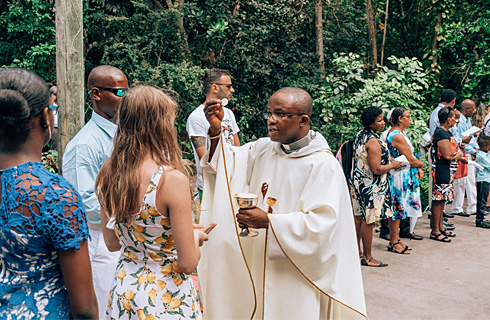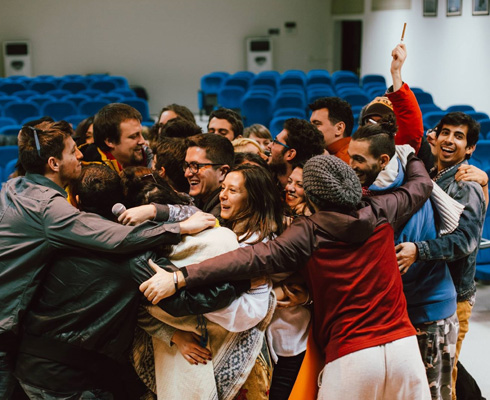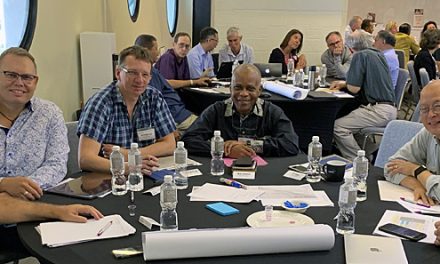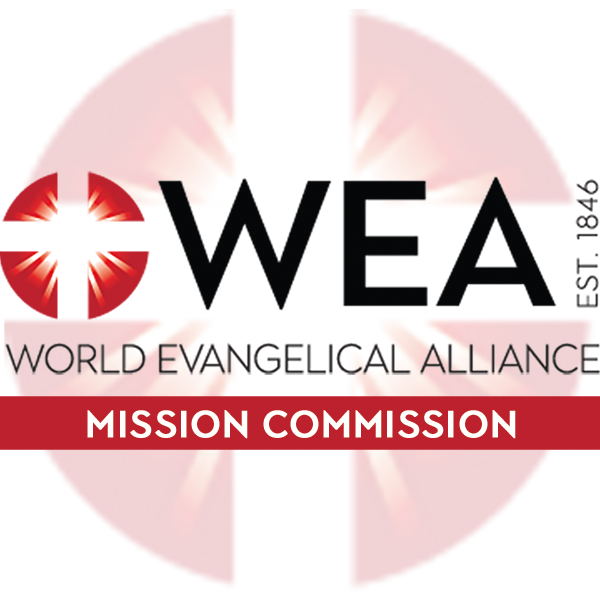LEADER’S MISSIONS FORECAST 2020
[50 Minute Read]
Dear fellow participants in God’s mission,
Grace and peace to you in the name of the Lord Jesus Christ.
It is already well into August 2020, so time for something of a “Leaders Forecast” update for the year. Quite frankly, it feels like we have alreadty travelled for an eternity this year, but gone nowhere. Between the lock-downs and online forums, civil unrest and worsening poverty, increased vulnerability and decreased access, political divisions and accelerating infections, missionaries and ministers of the gospel can be forgiven for feeling emotionally and spiritually, if not also physically, exhausted.
I am Jay Matenga and this is my leader’s forecast for 2020 — 1987 years after Jesus’ resurrection.
Consider It Joy
Every day when I wake up, I remind myself that God is on the throne and the Spirit of God is at work in the world transforming us into the likeness of Christ. As the Apostle James encourages us, “when troubles of any kind come your way, consider it an opportunity for great joy” (James 1:2 NLT). Rejoice! Rejoice when the pestilence ravages your nation. Rejoice when your economies grind to a halt. Rejoice when your neighbours despise you for whatever reason. Rejoice when everything we have felt certain about is undermined. Rejoice when our plans are unable to be acted out. Rejoice when it brings us to our knees crying out “maranatha, come Lord Jesus!”.
Why? Because the testing of our faith strengthens our ability to endure, to persevere. Why? Because patience and waiting on God for deliverance is core to our resilient faith. Why? Because it is a transformative process that matures us as followers of Christ and the community of God’s people in-Christ who are thoroughly dependant on the grace of God. This is worth more than gold or silver or precious stones or strong stock portfolios. It is our character, matured into the likeness of the character of God by the transformative power of the Holy Spirit, that we carry with us to the other side of eternity. We cannot take anything material with us, but we take that. It is the fruit of the Spirit within us—eternal capital.
So, rejoice with me brothers and sisters engaged in God’s mission, because God is doing something in our day that the prophets longed to see. It is shrouded in the mystery of suffering, yet it will be revealed. The Church will emerge from this trial on every side refined for a new era of history. Right now, in the crucible, we need to prepare for whatever that new era will require of us. The old ways in which we had so much confidence are being dissolved, something new is emerging—new, yet rooted in an ancient story.
Online Missions Conversations
Over the past five months I have been privileged to participate in numerous Zoom discussions and contribute to a few webinars. The Mission Commission hosted our own Virtual Roundtable on May 22nd with about 28 missions leaders in attendance. It took some time to process the input shared in that forum, but a report is now available to read or download here: https://weamc.global/2020roundtable/.
Where possible I have kept track of English-language medium missions discussions that have been put online. Sometimes I have attended in real-time (often in the middle of the night in New Zealand), for others I have viewed the event after the fact via the weblink provided. There are some very important discussions happening within organisations and among various networks. I only get to see the ones I’m invited to or that are made public. There are many more happening within missions associations, networks and organisations that Mission Commission leaders and I may not be aware of. Over time, I’m sure the outcomes of those conversations will emerge as future missions practice. Let us pray for one another unceasingly, that the Spirit of God would guide all our conversations and that the mind of Christ will be revealed whenever two or more gather online.
The Mission Commission has sought to add value to missions conversations by posting weekly blogs on the missions impact of COVID-19 with regard to different issues. Some of those I wrote to get the ball rolling but recently we have welcomed submissions from other contributors on subjects of their interest or expertise. We will continue to do that as we’re able. There are many more missions issues affected by COVID-19 to consider. This season is too precious to let the opportunity pass us by to explore implications for the new era of missions ahead.
COVID-19 Global Issues
Before reviewing some of the major themes emerging in missions conversations that I’m aware of, here are some significant COVID-19 (or related) impacts that are giving rise to these themes…
Interpersonal
The infection itself is driving a wedge into our interpersonal day-to-day relationships, forcing a low- or no-contact environment for most, in many parts of the world. This can heighten our suspicion of those we don’t know or trust.
The lack of face to face connections outside of the family are proving emotionally stressful and negatively affecting the mental health of many, especially young people.
General anxiety and lack of a sense of safety has increased for most.
Pressure on families has seen major increases in domestic abuse and intra-family violence around the world.
We have seen a rapid uptake of online gatherings, but the enthusiasm for them quickly dropped off for all but the most necessary and functional of meetings—e.g. the transmission of information or the sharing of ideas. It is COVID-19 necessary, cost-effective, good for the environment and convenient, but virtuality has its drawbacks.
On the positive side, more people are (potentially) able to participate in conferences and forums with easy access at low cost, especially with regard to global gatherings. But there still remains a “digital divide” and we must remember to ensure the views of those without access to necessary technology are included somehow—and their access to tech improved if possible.
Economic
Necessary lock-downs, shut downs and border closures have wreaked havoc on the world’s economy, which will be felt acutely everywhere, although with devastating intensity in impoverished nations with informal economies.
Vulnerable communities are struggling to maintain a basic standard of living and impoverished families are tempted to resort to desperate measures to ensure their survival, easy prey for loan sharks and human traffickers.
Border restrictions have amplified nationalism and increased distrust of outsiders, even if visitor or expatriate access can be gained.
The oil market has crashed and large investments in clean energy solutions are being prioritised and accelerated. Some argue that this marks the end of the Middle East’s oil age, with oil-producing nations in the region being thrown into unrecoverable deficits. This will negatively affect the global initiatives they have been pouring money into and the wellbeing of their people.
Global tourism has ground to a halt, taking billions of dollars out of host economies. Hospitality providers are being crippled and many venues may not recover.
Global transport systems will be negatively affected for a long time—future global travel may become prohibitively expensive.
Business supply chains have been interrupted to the point where global trade may be permanently affected in favour of regional hubs and local stockpile solutions.
Unemployment is rapidly rising in formal economies, threatening the livelihoods of many workers unable to quickly redeploy to other industries. This will impact low- and middle-income earners the most—reducing discretionary surplus they may have used for charitable donations.
Digital technologies are booming, particularly in the social interface space. Innovators are aware of the limitations of video conferencing and large online event hosting, and it is a ‘goldrush’ to find swift solutions and grab some of Zoom’s market share. Global digital interaction promises to become easier, more accessible and more ‘natural’ in the months and years ahead.
Civil Liberties
The virus has returned power to most governments after a period of declining confidence.
Restricted freedoms, economic disparity, and harsh law-enforcement has amplified civil unrest within nations. The emotional toll taken by virus response measures has eroded tolerance toward inequities and injustice, resulting in public protests and stronger attempts at governmental control.
Government surveillance technologies have advanced rapidly in an attempt to track contagion contacts. These will likely continue to be used by governments in ways that potentially affect civil and religious liberties.
In some parts of the world, the chaos caused by the virus has provided opportunities to increase persecution of groups perceived to be a threat to those in power, usually because of competing beliefs and moral convictions.
In the pursuit of certainty, and a growing distrust of traditional authorities, conspiracy theories that seem plausible are being created, embraced and promoted widely, even when faced with broadly validated research that provides evidence to the contrary but does not promise stability.
Emerging Missions Themes
It is impossible to capture the entire gamut of discussion happening with regard to the pandemic’s impact on missions. There are simply too many aspects of missions being affected (not to mention many different interpretations about what counts or does not count as ‘missions’ activity). Nevertheless, here are some insights grouped under themes that I am regularly encountering and have considered. The points below represent my reflections on what I have been hearing.
An Indigenous Future
With borders closing and access by foreigners otherwise restricted, it is becoming apparent that we need to promote, validate and support the recruiting, training and sending of missionaries from indigenous/near culture churches who can minister to people with least access to the gospel living within reach. If not through local churches, we ought to support the development of autonomous local interdenominational missions organisations equipped to send and serve missionaries in their regions. International missions organisations may find themselves less effective in light of the highly contextual ways of sending and supporting missionaries required for each region, not to mention the innovative methods of missions activity that are likely to develop with less influence from outsiders.
Aside from access difficulties, indigenous missions engagement is urgently needed because the margin of tolerance toward the imposition of one world’s ideas onto another world’s reality has reached zero. Many will claim this is the relativisation of truth, but it is actually the minimisation of power. Truth does not simply translate wholesale across cultural divides. It can, however, be seeded and allowed to grow uniquely within another context. Missiologists and historians of the global church note that it is typically the indigenous church that grows rapidly, not the missionary controlled church. This should give us confidence that the church will grow globally outside of the borders of traditional Christendom (the Industrialised Global North) in spite of the disruption to foreign missionary services.
For a long time, minorities in missions were content to “go along to get along” and endured being pushed to the edges of organisations. We are now seeing previously marginalised people push back against the dominant organisational culture’s priorities and privileges and challenge the majority view’s unconscious assumptions (usually assumed to be ‘superior’). Inferiority complexes are dropping away in favour of a growing confidence that other cultures’ ways of knowing are valid and valuable. This tends to be particularly evident in the tension between Industrial (Global North/Individualist) and Indigenous (Majority World/Collectivist) perspectives.
Previously, where foreign experts and their methods were accepted because they were accompanied by education and money, border closures and desperation for local innovative solutions has dislodged this dependency.
These issues are accelerating a shift in the balance of power toward the host and off of the would-be visitor/guest. Alongside increasing national pride and necessary self-sufficiency, people indigenous (or local) to a context are regaining their authority to decide what is or is not acceptable to their context.
In sum, this shift toward “centring” the indigenous/local perspective makes the imposition of knowledge from the outside less acceptable. The indigenous/local believers become the guardians of the gospel for their context. It places fresh emphasis on the need for the foreigner to take the subordinate posture of a guest who is invited to participate in the (co)creation of knowledge, or truth, in the host culture.
Transformative Collaboration
As I listen to Majority World and intergenerational missions perspectives, I hear that we need to move away from partnership (which emphasizes “parts” in contractual arrangement) and lip-service connections, toward a relational collaboration that looks more like fellowship/koinonia in the deeply interconnected covenantal sense. Match the need to better support indigenous missions initiatives on their terms with intentional covenantal collaboration, and you have a potent recipe for effective witness to a world that is pulling in the opposite direction: becoming increasingly separated and self-serving.
Similarly, integrating the participation, perspectives, and priorities of younger generations in missions thought, practice and decision-making processes, will help us discern the direction of missions for a post-pandemic world. As explored in our blogpost on youth, COVID-19 is having a huge impact on the younger generations and therefore the future of the Church and missions.
The kind of committed collaboration being discussed has been called “radical”, but radical can mean many things depending on the context. It will certainly be a challenge to shift our thinking towards a new way of being and working together. It may be radical, but I prefer to see this level of collaboration as (potentially) transformative if seriously adopted. It would require equitability and a full sharing of all kinds of resources towards deeply rooted and enduring relationship development.
This level of mutuality and reciprocity does not leave any of the participants in the relationship unchanged. Different values, perspectives and privileges will clash. Tensions will emerge that will need to be processed in ways that lead to understanding. Participants will need to learn to give way to one another, yield their privileges and serve as Christ did (the ‘kenosis’ in Philippians 2:6-7). This process (considerably simplified here) changes or transforms every participant in the relationship mix. Some have called this process hybridization. I agree and argue that it is the aim of Christian maturity (per James 1:2-4).
The desirable mutual transformation developed through the relationship becomes its most valuable outcome. Any other reason for forming a relationship—a project, objective, product, or purpose—should be subordinated to the relationship itself.
I am convinced that John 17:18-25 (the Great Commitment) is better suited as a central missions text for the new era ahead of us than Matthew 28:18-20 (the Great Commission). The Johannine reference focuses better on the outcome that will result in the world believing and knowing that the Father loving sent the Son: our loving unity. It also articulates how the Father sent the Son: in loving unity. The Matthew passage shows us the scope (all the earth) and what to do when moving beyond Israel (make disciples), but it is too easily interpreted in an individualistic and formulaic way. Whereas Jesus’ prayer in John fills out the covenantal/collaborative intention of what becoming a disciple means: a full participant in the integrally unified, ethnically-diverse and prophetic shalom-Kingdom of God. The meaning of which is developed throughout the epistles where the writers speak of what it means to live together in-Christ as followers of Christ.
The emerging focus on transformative collaboration, a testament to the world of the power of God to reconcile differences, can be illustrated in many New Testament passages and themes. I quite like Romans 12:1-2ff at the moment. John Piper has said, “missions exists because worship doesn’t”. When we read Romans 12 with a “Great Commitment” mindset, we see that our self-sacrificing unity in fellowship with each other in-Christ is our acceptable act of worship. Because it is our interpersonal and intercultural, self-denying interaction with one another, our preferring each other, that transforms our minds away from conforming to the divisive patterns of this world. With reference back to the unity emphasised in John 17:18-25 (see also Psalm 133), this is God’s good, pleasing and perfect will and our greatest gospel witness to the world. As Romans 12 progresses, Paul goes on to explain the types of interpersonal behaviour expected of God-worshippers in-Christ. Everyone has a place and a part to play. As we play ours, we need to lovingly allow others to play theirs and value each other’s participation. In this, God is worshipped and will be glorified throughout the earth.
If the global missions community was to invest in and practice transformative collaboration with indigenous missionaries and missions initiatives we should expect dynamic results. We should expect our sending churches to embrace differences and collaborate similarly. The world will look on with amazement and God will be glorified by our loving example of transformative collaboration made possible because of our Great Commitment to unity in-Christ.
Whole-of-Life Orientation
There is therefore now no separation between the demonstration and explanation of the gospel. The crisis created by COVID-19 will not permit us to merely speak of the goodness of God and Christ the Lord, we need to show that Christ is our Lord by demonstrating the goodness of God. Enough talk about prioritisation or polarisation. It is all one—an indivisible and interrelated whole: spiritual, material, and psychological. Most of the world understands this. It is the Industrialised Global North than fragments it. The world in the state it is in today needs to see such a compelling demonstration of the Kingdom that they will beg us for an explanation.
For too long the global missions community has been caught up in debates over definitions and prioritizations. We might as well be asking, “Which comes first, the chicken or the egg?” As our Latino elders have been saying for decades, our approach should be one of “Misión Integral”. Micah Global and Chris J. H. Wright (among many others) have adopted this in English as “Integral Mission” in attempt to reintegrate parts of a whole so that they’re not treated as separate components as “holistic mission” tends to treat them. In a time of COVID-19 crisis, prioritization debates become pitifully academic and disconnected from reality.
Today, missions must relate to the whole-of-life. Missions is calloused hands, dirty faces, open eyes and warm embraces; listening ears, compassion care, open mouths with hope to share. It is all that we are in-Christ in the world.
Whole-of-life includes the way we obtain income to sustain our lives. The global economy is in disarray and ripe for a major overhaul. The limits of the “neo-liberal” project and its tie to market forces have been exposed and found wanting. Some business-as-missions principles will need to be rethought in light of the challenges and shifts in thinking about business. In missions-oriented discussions concerning the desperation of people in impoverished situations, cooperative economics is being presented as a viable solution, rooted in the local-community. See our blog post about work for more about that.
Creation care is an aspect of our lived reality that is now unable to be ignored as integral to our missions responsibility. COVID-19 has been a tipping point for creation care and missions. It is rare now when a conversation around missions praxis does not include a positive discussion about engaging creation care issues. God’s people live in God’s environment with a Genesis 1:28 mandate to steward it well. The climate change narrative has merely spotlighted this afresh, demanding an Evangelical response. The Mission Commission is now working closely with the WEA’s Creation Care Task Force and Sustainability Centre to draw their expertise into the MC and keep the MC community aware of developments in Evangelical thinking about creation care to inform Evangelical missions practice.
Another issue that I place in this category is the plight and potential of people on the move—displaced people, refugees and diaspora. These broad categories of people have found themselves outside of their historic habitats at a time when the world shut has them in and xenophobia has increased around them. Reframing missions in a “whole-of-life” way must appreciate how life in limbo or permanent resettlement in a foreign culture makes people particularly vulnerable. Conversely, it cannot be denied that Christian migrants are revitalising the faith in formerly Christian nations. Herein lies ongoing potential for people on the move to be both recipients of the gospel and missionaries of the gospel.
In a similar way, we are aware that the expatriate servants of Jesus who have remained in foreign lands, or lockdown in their sending nations, have faced their own crises during the international travel hiatus. This has created new Member Care challenges for sending organisations and churches, on top of wrestling with what COVID-19 might mean for their viability as organisations. Harry Hoffman and the Global Member Care Network are to be commended for the way they are wrestling with these issues together.
Technological Advancements
One of the biggest accelerations caused by COVID-19 is the uptake of digital forms of communication and interaction (see our early blog about digital impacts). The technology industry estimates that we are now at least a decade ahead of the new-tech adoption curve and innovators are racing to cash in on the opportunities. The most noticeable impact on missions has been the availability of reliable, low-bandwidth, communications technology in the form of Zoom. Many missions were already using it as a secondary form of connection across borders (the first and far more preferred being in-person meetings). With the advent of COVID-19 and the impossibility of easy travel, Zoom has become the preferred conduit of missions communications.
The shift to digital communications has not only helped keep international communications alive, it has also become the lifeline for formal and non-formal missions education (see our blog about training) and the sharing of missions ideas in online-conferences and discussion forums. We are watching with interest how large national and global conferences have adapted to the online space with positive results. The ability for more people to access the event and the lowering of costs for them to do so (when travel and hospitality costs are removed from the mix) is compelling, as is the lessening impact on the environment.
Time zone differences and limited connectivity access remain challenges. The time zone issue is minor and offset by the blessing of more time with the comforts of home. As regards the digital divide, it could be argued that those without access to the internet would likely not be able to attend a conference in person anyway, not without scholarships. Nevertheless, that should not absolve us from finding ways to include them.
The privileges of online connections are not without other drawbacks. As noted above, it remains to be seen how new relationships will develop and old ones be maintained (but I personally have not found this to be a problem). The general consensus seems to be that interactive online meetings should last no longer than 90 minutes before fatigue sets in, which limits what can be achieved in one sitting.
I continue to wonder about the push-back against continuing online once travel is possible again. Some leaders maintain that face-to-face will be crucial even if travel carries greater cost and more complexity. But how many of our beliefs about the importance of in-person interaction are fuelled by other motivations? I have seen indicators of “travel-withdrawal” from missions leaders who have lived life constantly on the move. There is now no doubt in my mind that travel and conference attendance can be unhealthily addictive, even idolatrous. We are seeing similar effects with entertainment and sports stars who are diminished by the lack of audience enthusiasm to feed off. Missions leaders and conference speakers are prone to the same malady—needing to be celebrated for their expertise and insights. It is an identity-challenging time for some leaders, more so if conferences continue to be shifted online for the foreseeable future.
A major issue not mentioned yet but is related to all of the above is the demise of Short-Term Trips. The pandemic has had a devastating impact on the business model of Global North missions organisations that rely on short-termers and the whole industry that specialised in short term “voluntourism”. Indicators from the airline industry suggest the global transport systems will not return to pre-COVID levels for years, neither in availability nor affordability. The long delay in getting (wealthy) people moving around the globe again has crippled the Short-Term Trip model, with the exception perhaps of geographically close trips. I have heard talk of technology bridging the gap with “virtual short-term trips” being proposed, but I doubt that these will be of interest to the ‘target market’ who are looking for self-actualising experiences that look good on their CVs and may prompt some consideration of more formal engagement with missions. While there will be some cost from the loss of short-termers, missions as a whole will not be critically harmed.
The Motivation Problem
In light of all of the COVID-19 challenges and changes, I see one significant factor that has missions organisations locked in stasis: motivation for missions. The global missions community (as it is usually defined by post-1800s missionary sending models) is so heavily invested in a type of missiology formed over the past 220+ years of industrial colonial expansion that it struggles to conceive of how it can be any different.
Every era in the history of the Church has been marked by a particular missions emphasis or motivation. These were influenced by the challenges and opportunities the Church faced at the time and the needs of societies they were exposed to. Socio-economic factors both enabled and constrained ministry beyond the influence of the local church (i.e. missions). Monastic movements, wandering teachers, educational and health care institutes, social welfare programmes, Church diplomacy, trading and commerce, religious wars and conquests, were all formed out of the priorities of the Church and perceived needs beyond its parishes. The European colonial era widened awareness of the world dramatically, and also a sense of responsibility to address problems viewed from the perspective of Christendom. The modern missions movement was no different and it is not the evolutionary pinnacle of missions engagement with the world. A new age requires new missions.
A particular reading of Matthew 28:18-20 as “the Great Commission” was devised during Colonial expansion to provide motivational fuel for the Church to engage with new worlds. When the end of the Colonial era was met with a call to cease missions in the late 1960’s, Evangelicals identified new vistas of service beyond the reach of the local church—unreached people groups (UPGs). Matthew 28:18-20 and similar passages were employed afresh to defend the mandate to reach the unreached. New mechanisms for motivation were invented, not the least of which was the short-term trip, alongside large conferences and teaching of the Winter & Hawthorne Perspectives kind.
The challenge to engage gospel-poor peoples prior to the turn of a new millennium was compelling for many. As the new millennium progressed, however, enthusiasm diminished in traditional sending nations. Increased efforts to motivate for missions based on the post-1970’s model of UPG missions were seeing diminishing returns. More recently, Disciple-making Movements (DMMs) and Discovery Bible Study based methods emerged to enable more indigenous missions movements with minimal expatriate involvement, but it does not resolve the issue of motivation for missions.
COVID-19 has provided us with pause for thought about what missions should be post-pandemic. What will motivate the Church around the world into that new era of missions? Consider these seed ideas:
- The grand statement of Lausanne ’74 to mobilise “the whole Church to take the whole gospel into the whole world” remains an overarching theme for our globalised reality.
- We cannot deny that large groups of people remain without access to the gospel.
- The whole Church is still responsible for making the gospel available to the whole world and for nurturing new churches where few or none exist.
- The whole gospel is a demonstration and explanation of Christ in our midst that would see the shalom-Kingdom of God reconciling and influencing all relationships, between humans and God, humans and each other, and humans and our environments. All enabled by the Spirit of God present with and at work within and through those of us in-Christ.
- Disciple is short-hand for a follower of Christ the Lord, as well as one who makes the ‘Great Commitment’ to grow in faith as part of the community of faith in-Christ. The objective of missions remains: to keep inviting people to join us in-Christ, to co-create covenantal communities (churches) together for the benefit of all society.
- The motivation should shift from need (condescension) to love (communion) and our missions rhetoric should reflect this. The global missions community needs to divest itself of hubris and superior attitudes. We don’t need any more saviour complexes, regardless of the culture they are clothed in.
- Finally, a shift of emphasis from the Great Commission (going) to the Great Commitment (communing) should provide sufficient reorientation toward a much more collaborative, equitable, and potent post-pandemic missions praxis.
- Missions organisations that are already collaborating closely with indigenous missionaries in a whole-of-life way will thrive in the era ahead. Those that depend heavily on recruiting and sending expatriates, short or long term, to do the work of missions (however that is conceived) will increasingly find it difficult to survive.
Conclusion, Or Not
My cards are on the table as it were. From what I am hearing and perceiving of the “new normal” ahead of us, I am all the more convinced that the future of missions is indigenous. We will continue to need missions organisations that are able to develop and provide support for indigenous or near-culture missionaries to minister a whole-of-life gospel to people beyond the influence/reach of a local church. I contend that we should especially promote and prioritise support for missionaries from cultures closest to people with least access to the gospel, if for no other reason than because Christ is not yet known and worshipped in those places.
What then remains in missions for the people of God from traditional sending nations?
- Harvest Prayer—continuous, passionate, informed prayer for global missions via all means in all places.
- Missions Education—not necessarily teaching specific (Global North) missions methods, but Biblically-rooted missions principles with practical applications for the development of missionaries, the making of disciples, the planting of churches and the nurturing of deep in-Christ unity.
- Resource Sharing—indigenous missionaries need to be financially freed and equipped to minister effectively according to their contexts.
- Diaspora Ministry—working alongside migrant believers to reach your nation and ministering to non-believers from unreached peoples finding refuge in your nation.
- Distance Co-Discipling—creating long-term covenant relationships with indigenous missionaries/missionary families to journey together, share life together, and support one another as you grow in the Lord while living in different places.
- Fellowship Visits—when travel resumes, relationships can be greatly enhanced and missionaries encouraged by in-person visits by supportive expatriate friends (not as superiors or experts).
- Local Missions—in every nation there are groups in society that lack gospel awareness if not access. Minister there. I contend that missions activity is ministry beyond the influence of a local church (with evangelism a subset of missions). Missions should not be constrained to a cross-cultural endeavour only; this would invalidate indigenous missionaries. Attempts to restrict missions to cross-cultural engagement could be seen as a woeful attempt by cross-cultural sending agencies to protect their business model.
Am I suggesting a moratorium on long-term expatriate missionary service? Absolutely not. People are still ‘going’ and will continue to do so. Every nation has gospel-blessings to share with all nations. I am, however, detecting a trend that would see the sending of missionaries internationally become more difficult and less welcome, with decreasing motivational, moral and financial support in traditional sending nations—and therefore less able to sustain traditional sending organisations.
Yet God’s mission continues, so our involvement in missions needs to adapt. God will continue to call people to serve in missions, but as we detected in our research for the book “Mission In Motion: Speaking Frankly of Mobilisation”, a calling to missions is usually nascent and shaped by the context in which one is called. A new context has been thrust on us. Missions may become more indigenous out of necessity but that should not absolve any of us from responsibility. The global gospel demands global collaboration so that the whole world will know and believe that the Father lovingly sent the Son. So, let us pursue the Great Commitment and #stayonmission.
Pray
- For wisdom for all Christian leaders who are seeking to navigate their way through the crisis caused by the global pandemic. For a spirit of discernment to effectively understand the times and know how God’s people under their care should respond to the challenges they are facing.
- For courage for missions leaders especially; that they will listen carefully to the people they are responsible for and accountable to, and make the changes that are necessary for their missions organisations and personnel to thrive in the new normal ahead of us.
- For indigenous or local-culture innovators called of God to take the gospel to those beyond the influence of a local church who have little access to, or understanding of, the gospel. That God will supply all their needs according to Christ Jesus’ riches, and the obedient generosity God’s people.
- For revelation from God for all of us to know how to prepare, collaborate and resource missions activities so that the gospel will continue to spread unhindered in its fullest expression, and that the Kingdom of God would be made even more apparent to the world around us—especially among people with least access to the knowledge of God in Christ.
Follow
Click here for Jays’ personal blog. Jay can also be followed on Facebook here.





















